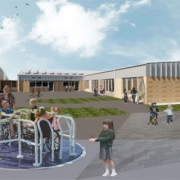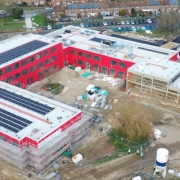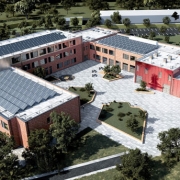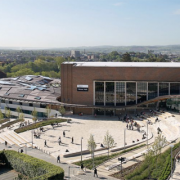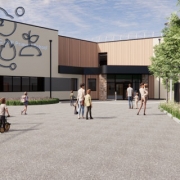End-of-Module Installation Ceremony Milestone at multi-million pound Surrey-based Low Carbon School
A significant milestone in one of the DfE’s ‘Low Carbon Pathfinder’ projects has been reached with an end-of-module-installation ceremony taking place at Merstham Park School, near Reigate in Surrey.
The ceremony was attended by representatives from DfE – including Paul Mustow, Divisional Director for DfE – GLF Schools and the project’s principal contractor, McAvoy. With final fit-out and site works now underway, the multi-million-pound school that will provide learning space for around 900 pupils is scheduled for final handover in time for the new academic year in September. The new 2-3 storey building will replace the school’s temporary facilities that have been in use since the school’s opening in 2018 and will provide pupils with high-quality classrooms, play space, a dance studio, an all-weather sports pitch, and a sports’ hall.
The ‘Low Carbon Pathfinder’ school for pupils aged 11-16 seeks to minimise energy usage by implementing the ‘Be Lean, Be Clean, Be Green’ energy hierarchy which focuses on reducing the demand for energy at source through passive measures before considering efficient systems and renewable technology. The building will run mainly on electricity and will feature roof-mounted solar panels. The biophilic design approach encourages pupils and staff to engage with nature, trees will be positioned around sun boundaries to create an inviting environment and assist with cooling.
All the school accommodation, apart from a new sports hall, has been manufactured in a factory-controlled environment at McAvoy’s state of the art facilities. Over the course of six weeks McAvoy’s expert team craned 178 modules into place. Its onsite team will now carry out final ground works and fit-out in advance of official handover later in the year.
McAvoy’s Contracts Director, Martin O’Neill said the adoption of offsite construction, as opposed to more traditional build methods, had major advantages for the DfE, school and its local community.
“In this instance, by choosing an offsite solution the Department was able to commit to delivering a high quality, low carbon school within a much shorter time frame than would have been the case otherwise. In addition, with much of the school structure being manufactured offsite, both the schools’ pupils who are studying in temporary accommodation and the local community will be exposed to significantly less site traffic movements and disruption. We are delighted with the progress so far and we are looking forward to seeing the pupils being able to enjoy their new school having been in fully temporary accommodation for more than two years.”
Ron Clarke, Chief Executive Officer at McAvoy, said: “This will be an exceptional school building that will meet extremely high environmental standards. We are honoured to have been selected by DfE to drive forward its commitment to low carbon schools within the context of this Pathfinder Project.”
Allan Thomson, Project Director at DfE added:
“I am delighted that we have reached this significant milestone. It is testament to the hard work and collaborative approach adopted by everyone involved, from the DfE project team and our technical advisors (MACE) to the McAvoy team and of course the GLF Trust who will be the ultimate end-user of what will be a wonderful teaching and learning environment that will benefit not only the staff and pupils but also the wider community for years to come.”
Andy Ward, Head of School at Merstham Park is looking forward to moving into the new school and the brand-new state of the art facilities.
He said: “Our new home will enable our students to flourish in a truly first-class educational setting through the creation of inviting and interactive learning environments”.
He added: “As a community focused school and in line with our core values, we look forward to sharing our facilities with our local community.”
Jon Chaloner, CEO of GLF Schools is delighted that the new building has been built to high environmental standards championing the DfE’s long-term commitment to low carbon schools.
He said: “It has been a pleasure to watch the build grow and develop and the highlight has been to finally tour the site and understand how it will look this summer when it’s finished. With its state-of-the-art facilities, this new build will create wonderful opportunities for our students at Merstham Park and our other local GLF schools, Lime Tree and Merstham Primary who will be able to share, along with the wider community.”
The McAvoy Group is one of the leading offsite manufacturing and MMC specialists in the UK and Ireland. It offers a full range of design, manufacturing, fit out and construction services for the purchase and hire of high quality, affordable and sustainable modular buildings in the health, education, commercial and infrastructure sectors. Renowned for innovation, it is a key player in the pioneering Seismic Consortium, an R&D project launched to revolutionise the design and delivery of school buildings. The Seismic II project is also now underway, which will see its learnings applied to other sectors, including healthcare and commercial.


